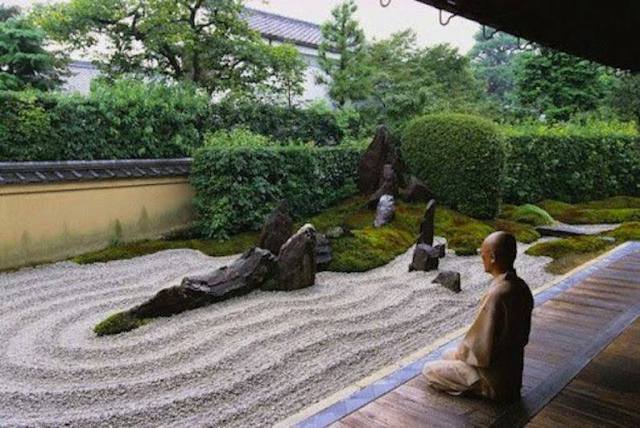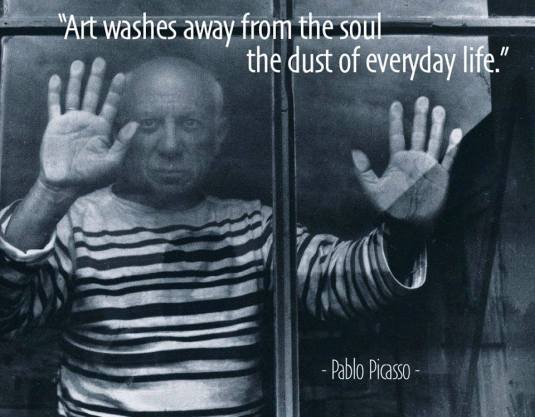“With traditional arts in Asia much emphasis is put on long-term practice and effort, so as to reach continuously higher levels of skill development. There is a deeper character training happening as well, to reduce the ego’s voice, let go of fears, cultivate mindfulness, increase gratitude and live more fully in the present moment.” ~Christopher Chase

Cultivating a Beginner’s Mind
Beginner’s Mind is a phrase from Japanese Zen teacher Shunryu Suzuki’s book, Zen Mind, Beginner’s Mind. He uses it to describe an approach to life that is empty of preconceptions and egotism, yet very mindful.
“In Japan we have the phrase shoshin (初心), which means “beginner’s mind.” The goal of practice is always to keep our beginner’s mind… This [means] an empty mind and a ready mind. If your mind is empty, it is always ready for anything; it is open to everything. In the beginner’s mind there are many possibilities; in the expert’s mind there are few.”
The idea of an empty mind in Asian cultures is different from Western conceptions, which signify that something is lacking. It is closer to our idea of being open-minded, providing a spacious awareness that allows the outer world to flow in freely through our senses.

The Chinese philosopher Lao Tsu shared a similar conception of emptiness, in verse 11 of the Tao Te Ching, describing structured spaces which invite participation as being very practical and useful.
“Thirty spokes share the wheel’s hub;
It is the center hole that makes it useful.
Shape clay into a vessel;
It is the space within that makes it useful.
Cut doors and windows for a room;
It is the holes which make it useful.”
Therefore benefit comes from what is there;
Usefulness from what is not there.”
In Zen Buddhism, to maintain a beginner’s mind means to be open to continuous growth and deeper understanding. One is encouraged to drink in each moment of life, without excessive desire, pride or judgment.
A beginner’s mind is not willful, power seeking or egocentric. As a beginner, we are encouraged to develop skills without comparing ourselves to others or seeking to be superior in any way. In Japan, this also relates to the idea of kenkyo (謙虚) which means to cultivate modesty and humility, to not be full of oneself.
In Zen Flesh, Zen Bones (by Paul Rep) there is a section entitled 101 Zen Stories. Here a tale is told of a University professor who visits Nan-in, a Japanese Zen master. The professor says he wants to learn about Zen, but is filled with his own knowledge and opinions. Nan-in pours tea into his cup and does not stop so that it begins to overflow.
“What are you doing? It is overfull. No more will go in!” yells the Professor. “Like this cup,” Nan-in said, “you are full of your own opinions and speculations. How can I show you Zen unless you first empty your cup?”
Zen & Japanese Traditional Arts
Even now, a beginner’s mind is very much a part of traditional arts training in Japan. The idea of mu (無) or mushin (無 心) is commonly taught to students. It is often translated as “not, nothing” or “no mind” but it’s closer to openness of awareness in meaning. Students are encouraged to be attentive and mindful, carefully observant of the present moment.
With traditional arts education in Asia much emphasis is put on long-term practice and effort, so as to reach continuously higher levels of skill development. There is a deeper character training happening as well, to reduce the ego’s voice, let go of fears, cultivate mindfulness, increase gratitude and live more fully in the present moment.
A core idea with Zen influenced arts is that deep mastery and learning requires that we keep all our senses open. Over time one’s knowledge becomes intuitive, instinctual. We do not have to “think “ consciously to act skillfully.
The goal with arts training is not to receive praise or do better than others, but to grow spiritually, develop as a human being and learn to live each moment peacefully, mindfully and deeply connected to the present.
The Buddhist scholar D.T. Suzuki (no relation to Shunryu Suzuki), gave this description, in his essay An Introduction to Zen Buddhism:
“The idea of Zen is to catch life as it flows. There is nothing extraordinary or mysterious about Zen. I raise my hand; I take a book from the other side of the desk; I hear the boys playing ball outside my window; I see the clouds blown away beyond the neighboring wood — in all these I am practicing Zen, I am living Zen. No wordy discussion is necessary, nor any explanation… When the sun rises the whole world dances with joy and everybody’s heart is filled with bliss. If Zen is at all conceivable, it must be taken hold of here.”
Living & Learning in the Modern World
Zen teaches that living in this way is not difficult, but modern “civilized” people make it hard for themselves, and their children. Educational systems (both in the West and in Asia) put great emphasis on competition, status and ranking, requiring the memorization and testing of knowledge.
The goal of modern schooling is for students to remember vast amounts of information, to do better than others on tests, so that one can get higher grades, get into the “best” college, attain a high paying job. This “training” (that most of us have received) keeps our minds focused on information storage, future goals and how we compare with others in the present.
Living and learning this way has created a world where a rat race mentality dominates. Where many “well educated” people’s minds are crammed with disconnected bits of knowledge (about math, physics, history, etc.) that we never developed the ability to apply in meaningful ways.
In recent decades, Western psychologists have described some of these dynamics. Carol Dweck talks about a growth vs fixed mindset. A growth mindset is open and curious, the person understands what they are studying and is continuously learning, updating their knowledge and skills. We do not compare ourselves with others and see learning as a lifelong process.
Psychologist Mihalyi Csikszentmihalyi describes this approach to life and learning as flow, the psychology of optimal experience. With our minds open to the present moment we experience a sense of unity and intimate relationship with our current situation and context.
A growth mindset and flow are quite similar to the beginner’s mind approach of Zen. In the book Zen in the Art of Archery, Eugen Herrigel shared his Japanese archery teacher’s advice, “Don’t think of what you have to do, don’t consider how to carry it out! The shot will only go smoothly when it takes the archer himself by surprise.”
Goals can be helpful, but the focus with Zen arts is to anchor our consciousness in the present moment, detached from ego and desire. “A goal is not always meant to be reached, it often serves simply as something to aim at,” is how Bruce Lee put it.
Numerous athletes, artists and musicians have described their most satisfying experiences in this way, as being in “the zone,” where a sense of self drops away and we feel a deep connection with the present moment. Skillful actions happen of themselves, intuitively, without willful thought or direction.
When playing sports or music, thoughts of future outcomes or failure can trigger powerful emotions that distract our awareness. It is only by paying full attention to what is happening NOW that we can respond mindfully and effectively to current conditions, and deeply connect with the present moment we inhabit.
Moreover, as our skills develop without egoism, we will naturally cultivate positive psychological qualities (such as mindfulness, optimism, compassion, creativity, kindness, joyfulness) that make our lives more happy, successful and meaningful.
As the composer John Cage put it, “Get yourself out of whatever cage you find yourself in. There is poetry as soon as we realize that we possess nothing.”
Developing Deep Appreciation for Our Lives
When we learn and grow in this way, over time we may discover what Japanese call ikegai (生き甲斐), a deeper sense of purpose and direction to our lives. Ikegai is about developing your many unique gifts so that you can share these with the world. Finding our life’s purpose brings joy to us and benefit to others.
To do this successfully, it helps to be aware of how we are connected to the rest of the Universe. Finding deep meaning can only be discovered in the now, not in the future. This is why Taoist and Zen teachings encourage us to cultivate an intimate relationship with (and appreciation for) Nature as she manifests in the present moment.
We are at all times connected to the Cosmos in ways that mundane concerns distract us from seeing. Alan Watts has described how we are each like waves of a larger ocean, unique and creative expressions of the Universe we inhabit.
When our mind is empty of self-centric thoughts and emotions, we can more easily connect with our surroundings. Maintaining space in our minds allows the magic of the world to enter through our senses.
For Taoist sages and Zen masters the Universe that surrounds us is experienced as our “original face.” It’s the Source of all that exists, a living matrix of creativity that we all belong to, that has brought each one of us into being. As Alan Watts put it:
“If you see yourself in the correct way, you are all as much extraordinary phenomena of nature as trees, clouds, the patterns in running water, the flickering of fire, the arrangement of the stars, and the form of a galaxy. You are all just like that…”
While this is not difficult to comprehend conceptually, it can be challenging for “civilized” people to experience directly and frequently. Not buying into the rat race mentality of modern cultures is an essential first step. Training mindfully in an art form or sport, learning to meditate or do yoga, will provide us with a system of practice that assists greatly.
As we learn to meet the world like an empty cup, we allow inner and outer realms of our lives to flow together. Where there had been separation before, now there is greater unity and love. Every living being we meet, every experience we have, can be seen as magical in some way.
More and more, we may begin to experience yūgen (幽玄), a term that Japanese artists and poets have used to signify a deep appreciation and feeling of relatedness with the Universe.
Awareness & Experience of Inter-being
Vietnamese Zen teacher Thich Nhat Hanh describes this as a deepening awareness of inter-being, the fundamental unity and interconnectedness of every “thing” in the Cosmos. In a flower exists water from clouds, energy from the sun, molecules from the earth, atoms created billions of years ago within stars.
This understanding is very important if one wishes to grasp Buddhist teachings about emptiness, as Thich Nhat Hanh explains:
“A flower cannot be by herself alone. To be empty is not a negative note… A flower is empty only of a separate self, but a flower is full of everything else. The whole cosmos can be seen, can be identified, can be touched, in one flower. So to say that the flower is empty of a separate self also means that the flower is full of the cosmos.”
Such an attitude and recognition brings greater peace and happiness in our lives (and wisdom in our actions) because instead of trying to manipulate outcomes and take from the world we become more aligned with Nature, moving in unison with life, like a musician or dancer.
By letting go of distracting thoughts and emotions throughout the day, we create space for the world to move through us, be a part of us. This letting go allows for a deeper experience of inter-being, our intimate connectedness with everything and everyone.
Over time, connecting & letting go, like breathing, becomes second nature for us. Not seeking far off goals that the modern world considers to be important, we discover that everything we need is already here. We just need to cultivate inner space and connect fully with what is happening right now.
Maintaining a beginner’s mind helps us to experience flow in our activities, joy in our relationships and growth as human beings. Like the lead characters in the films Groundhog Day and About Time, we start to discover deep meaning and poetry in all of life’s moments.
In the Japanese tea ceremony this connection and appreciation is expressed with the idea of ichi-go ichi-e (一期一会), translated as “one time, one meeting.” Every meeting we share with others is a once in a lifetime event, a sacred moment that we can treasure and enjoy deeply.
Over time, as we practice seeing and living in this way, everything we do can be experienced as an art form to be mastered and/or appreciated, every interaction with others becomes a potential source of joy, gratitude, peace, love and beauty.
We will never find happiness in far off places or goals that we imagine in our heads. The way to happiness is to realize deeply, that each moment of life― each snowflake, flower, mountain, sunrise, friendship― is a work of cosmic art, both unique and precious. Each step of our journey we have already arrived, for we have always been home.
“To dwell in the here and now does not mean you never think about the past, or responsibly plan for the future. The idea is simply not to allow your self to get lost in regrets about the past or worries about the future. Letting go gives us freedom, and freedom is the only condition for happiness.” ― Thich Nhat Hanh
“Zen professes itself to be the spirit of Buddhism, but in fact it is the spirit of all religions and philosophies. When Zen is thoroughly understood, absolute peace of mind is attained, and a man [or woman] lives as he ought to live.” ― D.T. Suzuki
The same stream of life that runs
through my veins night and day
runs through the world and
dances in rhythmic measures.
It is the same life that shoots in joy
through the dust of the earth
in numberless blades of grass
and breaks into tumultuous waves
of leaves and flowers.
It is the same life that is rocked
in the ocean-cradle of birth
and of death, in ebb and in flow.
I feel my limbs are made glorious
by the touch of this world of life.
And my pride is from the life-throb of ages
dancing in my blood this moment.














Pingback: Awaiting its Bloom – Panoramic Reflections
Thank you Christopher. Beautiful, dead on, inspiring, etc…re-blogged.
Thank you Lou. 🙂
Pingback: Zen and the Art of Living Deeply | Zen Flash
This post is full of wisdom and love. Uplifting for sure. Thank you always for the insights and wisdom you share in your blog. I always find joy your postings. The teachings are enlightening and comforting.
I appreciate that Gretchen, and so happy to hear that… yes, this was special for me to write as well. Kind of a summary of what I’ve learned from living half my life in Japan!!
Pingback: Zen & the Art of Living Deeply | I can expl...
I love these posts of yours. Thank you so much.
Most welcome Rebecca!
Thank you. I needed that.
Reblogged this on Gr8fullsoul.
Pingback: The Perpetual Curse of Feudalism, Reinvented | Creative by Nature
Pingback: Every meeting we share with others is a once in a lifetime event | Zen Flash
Good article on the concept of nomind and beginners mind…
But that is just a goal, an ideal, somewhere where you eventually might want to be. It resonates with a lot of spiritually evolved people on this planet, because they are at a level of spiritual development where they can understand it and appreciate it… The only problem here is that for the vast majority of the people, it is like a mirage in the desert! It is totally elusive, when neo-Zen followers talk about this concept, they never speak about how to reach there…
Of course there has to be a lot of awakening and spiritual development/healing before one reaches there … And maybe life in a Zen monastery would cater to that … But uninitiated laymen have no clue what to do – they just read articles on the internet to cater to their spiritual developmental needs..
That’s why I do not like the enumeration of this Zen concept in such a manner as you have done. There is a great risk that it will become dogmatic … And thus the Zen will be destroyed. Therefore, this idea is incomplete in itself, it requires a lot of other instruction, teaching and practice to go along with it …
It definitely adds to our theory of the supreme ideal of life, but it is not practical at all, in itself, as to how to get there!
I would like more information as to how to begin & get to experience emptines & harmony ( are they similar?)
Each person is unique and must follow their own path and find what resonates with them. Emptiness and harmony becaome the same thing, yes. Richard Rose was an American spiritual teacher who formulated a system of zen for westerners. Other methods include tai chi, yoga, qi gong, meditation, and the mind training of A Course in Miracles.
Pingback: The Journal Zen si Arta de a Trai Profund - The Journal
Reblogged this on E'n'M.
Thank you!!
Shin does not correspond to mind only. Shin corresponds to heart and mind.
Yes!
Fabulous exposition Christopher – thank you! It pulls together some ideas that have been bouncing around my head for years. I will come back often to this piece.
Many thanks for this; exactly what is needed for the future of humanity http://www.freecriticalthinking.org/daily-pickings/1956-full-of-our-own-opinions
Reblogged this on Siouxsie's Space and commented:
Something to think about…
Thank you!!!
This is a very interesting read! Thanks for the insight.
Attractive and useful for life.
So much elaboration . Mentation . Just be aware of our spirit breath. So hard to do? Practice. So simple? Yes, a huge problem for our complicated , deluded minds.
Pingback: You Can’t Always Get What You Want, But… | Creative by Nature
Pingback: Zen | Anandave's Blog
Pingback: Happiness Cannot Be Pursued | Creative by Nature
Pingback: Zen & the Art of Living Deeply – UNITED EARTH
Pingback: Omotenashi – The Japanese Spirit of Giving | Creative by Nature
Pingback: Zen & the Art of Living Deeply – Letters to Chelsea
Pingback: 2019 – Year of Beginnings – Rebecca A Holdorf
Pingback: Tao & Zen - The Finer Things
Really good one and much needed in today’s world… Thank you very much!!!
Will surely give a try….
Wow! What a very well written, inspiring, insightful, and complete article 😀
Thank you so much for distilling this and sharing it with the world!
Thank you!
Pingback: Zen & the Art of Living Deeply | The Laundry Line
Pingback: Let go – Outersite.org
Exteeodinary, profound and compassionatel. Thank You . Thank you…..just in time!!! Remembering the interconnectedness of everything!!!
Pingback: Zen and the Art of Living Deeply | Zen Flash
Thank you for sharing a beautifully written article.
Pingback: The Art of Systems Thinking – Christopher Chase | Creative by Nature
Pingback: The idea of an “empty” mind in Asian cultures is different from Western conceptions | Zen Flash
Thank you Chris, yes all of this stuff is heart warming and inspiring. I am grateful for how you weaved teachings together.
Thank you Melanie!!
Pingback: Zen & the Art of Living Deeply | arthur~battram…